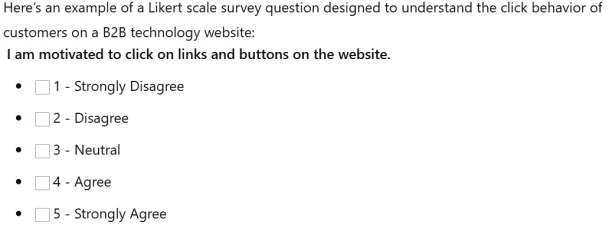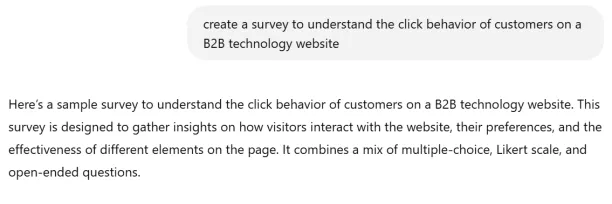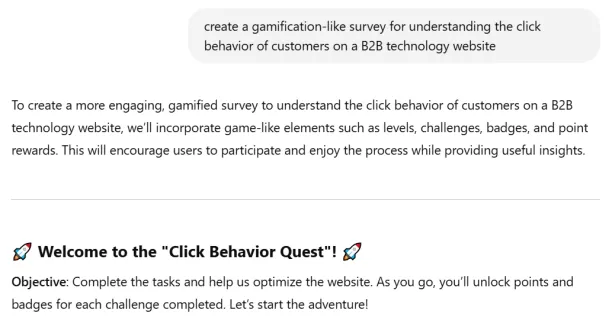In November 2022, ChatGPT, a Large Language Model, became the game-changer in the realm of survey research. Companies leverage this AI tool to design, implement, and analyze surveys more efficiently. If you are looking for a survey creation or survey analysis tool, you can check out our vendor benchmark.
Explore innovative use cases of ChatGPT survey research and tips for using ChatGPT in survey preparation and analysis:
ChatGPT in survey creation
1. Crafting Effective Introductory Text
A compelling introduction is essential to set the context of a survey. ChatGPT can serve as a virtual assistant in crafting welcoming, informative introductory text for any survey.
For instance, when creating a survey on work-life balance for employees, a user might prompt ChatGPT: “Please create an introduction for my survey on work-life balance. State the survey’s purpose and assure anonymity of data.” In seconds, ChatGPT can generate a clear, engaging introduction that aligns with the survey’s objective.
This saves time and ensures that the tone and language resonate with respondents, making them more likely to participate.
2. Generating Tailored Survey Questions
ChatGPT excels at creating specific, well-phrased survey questions, especially in fields like customer satisfaction and employee engagement. By giving prompts related to customer behavior, for example, users can instruct ChatGPT to “Create a Likert scale survey question to understand the click behavior of customers on a B2B technology website.” Within seconds, the model produces a question with structured response options.
Figure 1. Prompt example for a survey question creation on ChatGPT

This can be especially helpful for those who need to rapidly create surveys that effectively target complex issues. ChatGPT’s ability to tailor questions according to specific criteria makes it a reliable tool for survey question creation, especially for marketers and researchers who frequently gather user insights.
3. Enhancing Question Clarity and Structure
Improving question clarity is essential for obtaining accurate responses. Survey creators can use ChatGPT to rephrase or clarify questions that may be ambiguous. For instance, if a question reads, “What shampoo do you use on your head?” ChatGPT can refine it to “What type or brand of shampoo do you use on your hair?” Ensuring that survey questions are clear and direct helps in collecting responses that are both accurate and representative of user opinions, which is crucial for effective data analysis.
4. Creating Complete Surveys
For more complex tasks, ChatGPT can support the development of entire surveys. By providing the model with a theme, such as “customer behavior” users can quickly receive a range of questions that cover various facets of the topic.
Figure 2. Prompt example for a survey creation on ChatGPT

After this prompt, ChatGPT created 14 questions from different question types, from open-ended to Likert scale questions, which potentially provide valuable insight into click behaviors of B2B technology websites.
This ability to create an entire survey structure allows businesses to leverage large language models to develop surveys from beginning to end. ChatGPT can function as a virtual tutor, guiding users through the survey creation process and providing feedback along the way, which is particularly helpful for college students or beginners in survey design.
5. Personalized and Adaptive Surveys
Personalization in surveys increases engagement by ensuring questions are relevant to each respondent. ChatGPT’s advanced content creation capabilities allow it to generate adaptive questions based on user responses, demographic information, or previous feedback.
By asking personalized questions, surveys become more interactive, which can improve response rates and provide deeper insights into user preferences. This is especially valuable in educational and customer satisfaction surveys where tailored questions make respondents feel that their unique perspectives are being considered.
6. Gamification to Enhance Engagement
Surveys are more engaging when they include elements of gamification, and ChatGPT is well-equipped to turn basic surveys into interactive experiences. For example, it can suggest quiz-like questions, reward systems, or feedback mechanisms that make answering survey questions more enjoyable.
By giving prompts, for example, “create a gamification-like survey for understanding the click behavior of customers on a B2B technology website,” ChatGPT might provide a more engaging survey to increase survey response rate.
Figure 3. Prompt example for a gamification-like survey creation on ChatGPT

Gamification techniques, such as assigning points or offering small incentives for completing a survey, can lead to higher completion rates and more enthusiastic responses, particularly among younger respondents and in contexts like education and technology.
ChatGPT in survey analysis
7. Survey Pre-Testing and Optimization
Before launching a survey, pre-testing questions for clarity and effectiveness can prevent biases and misunderstandings. ChatGPT can serve as a tool for pre-testing by simulating responses and identifying unclear questions or terms that may need refinement.
Users can input draft questions, and ChatGPT provides feedback on potential improvements. This process supports better question phrasing and structure, leading to higher quality data and reducing the need for extensive manual editing.
8. Analyzing Survey Data for Insights
Once responses are gathered, ChatGPT can assist in analyzing patterns within the data. Through data analysis, ChatGPT can help identify trends, summarize key findings, and even suggest strategies based on insights from survey results.
For instance, a company could use ChatGPT to analyze customer feedback on a product, revealing areas for improvement and creating a roadmap for future actions. This approach not only provides quick insights but also supports companies in staying agile with data-driven decision-making.
9. Reporting and Visualization
After analyzing survey responses, presenting the findings in an understandable and visually appealing format is essential. ChatGPT can assist by generating summary reports, suggesting data visualization options, and even writing executive summaries that highlight key insights.
For example, in an employee engagement survey, ChatGPT could create an overview for management, outlining trends in job satisfaction and areas for improvement. This reporting support makes survey data accessible to stakeholders and facilitates a deeper understanding of the results.
10. Audience Segmentation and Targeting
Audience segmentation is another powerful use case. By analyzing responses and grouping them based on shared traits, ChatGPT can help create customer segments, which is invaluable for marketers looking to target specific demographics.
For example, if a survey collects data on customer preferences, ChatGPT can categorize respondents based on similar answers, helping businesses tailor marketing efforts and product development to each segment’s needs.
11- Prioritizing next steps
Prioritization is key in implementing insights from surveys or else the organization may be overwhelmed with many actions to take. ChatGPT / generative AI tools can help prioritize initiatives.
12- Identifying areas for further research
ChatGPT can help companies identify gaps in their current research or areas that require additional investigation based on survey results and insights.
For instance, after analyzing survey data on customer churn, a company can consult ChatGPT to identify possible factors not covered in the survey that may contribute to churn and recommend new research avenues to explore.
For more on ChatGPT use cases, check out our comprehensive article.
Tips for using ChatGPT in survey preparation and analysis
1. Use ChatGPT to draft clear and unbiased survey questions
Poorly worded questions confuse respondents and distort data. You can ask ChatGPT to help you write simple, neutral, and non-leading questions.
✏️ Example prompt:
“Help me write 5 unbiased survey questions about employee satisfaction at a university.”
This helps avoid leading phrases, double-barreled questions, or vague terms, which can undermine data quality.
2. Ask ChatGPT to translate questions into plain language
Complex wording reduces response rates and increases misunderstanding. Ask ChatGPT to simplify the language of existing questions.
✏️ Example prompt:
“Rewrite these questions in plain language for people with high school education.”
3. Use ChatGPT to identify survey themes or gaps
Before writing questions, you can use ChatGPT to help brainstorm potential themes based on your topic or literature review summaries.
✏️ Example prompt:
“List key topics to include in a survey on remote work satisfaction, based on recent research.”
This can help improve content validity early in the design stage.
4. Ask ChatGPT to generate synthetic survey responses for testing
Before sending your survey, you can use ChatGPT to simulate how different people might respond. This helps test survey logic and question flow.
✏️ Example prompt:
“Generate 3 example responses to this survey on mental health services.”
It can reveal if your survey feels too long, confusing, or includes unclear answer choices.
5. Use ChatGPT to classify and summarize open-ended responses
ChatGPT is especially useful for analyzing open-text answers. It can group responses by themes, summarize insights, and even suggest coding categories.
✏️ Example prompt:
“Here are 25 open-ended responses. Summarize the key points and suggest 5 themes.”
This saves time, especially in the qualitative coding stage, often the most time-consuming part.
Further Reading
- Top 6 Market Research Software
- Top 6 Online Survey Participant Recruitment Services
- Top 5 Pollfish Alternatives
FAQ
What is the purpose of surveys?
A recent report shows that ~90% of marketers use online surveys in their research.1 Companies utilize surveys for several reasons, such as:
getting insights from the customers
measuring brand awareness
conducting market research.
Can AI fill a survey?
Yes, artificial intelligence (AI), including tools like ChatGPT, can fill a survey by generating AI-based responses to survey questions. Using large language models trained on extensive data, AI can provide responses based on patterns and context learned during training. This approach allows AI to simulate a user’s survey answers, although these responses are not based on personal experiences or unique insights.
Instead, AI-generated content reflects general trends and knowledge, making it useful for testing survey structures or gathering a basic outline of possible answers, especially in education or customer satisfaction research. However, for valuable feedback and ethical data collection, responses from real users, like college students or other target audiences, are essential.
External Links
- 1. 90% of marketers see revenue impact from social media, survey says. MarketingDive. Accessed: 11/07/2024.


Comments
Your email address will not be published. All fields are required.